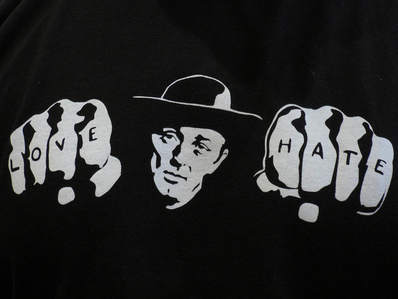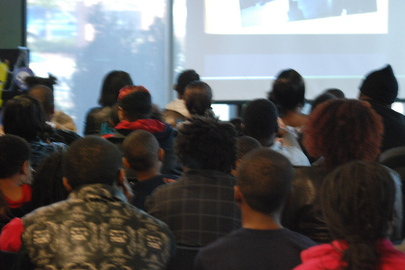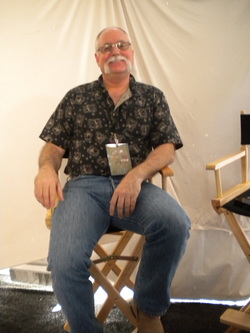 Night of the Hunter.
Night of the Hunter. But somewhere, deep down, is a nagging little voice asking me why I'm working to raise money for another non-profit besides my own. But that voice really needs to pipe down. Why? Because I'm working to raise money for the non-profit I work for every day. Yes, EVERY day. In case you didn't know, Media Arts Center San Diego has been around for quite a while, spreading the gospel of digital media and storytelling since its inception. That gospel has grown to include camps for kids, documentary classes for teenagers, partner programs with California libraries, and workshops for adults. Everything from how to take pictures with your fancy new DSLR to how to build your own steadicam.
Oh, and we also show movies.
That's my job. I often get an odd reaction from people when they find out what I do. "You mean you get to watch movies? All the time?"
Yes, all the time. I'm lucky enough to have a job that includes something most people (including myself) enjoy. I get to watch movies, meet filmmakers, and sometimes visit film festivals. I'm not going to tell you that it's not as glamorous as it sounds, because you wouldn't believe me anyway, and that's like complaining that your Maserati doesn't purr at 20 mph like it does at 80. Small potatoes.
So yes, I do love what I do. I love watching movies. But I also feel like I'm participating in something that matters. Yes, the education programs that are provided by Media Arts Center are wonderful. There is a wonderful staff of people that attend to all the details and ensure that they are enriching for kids young and old. The video production programs are also wonderful. Media Arts has managed to help a plethora of organizations that don't have access to the digital media tools and knowledge that we have in order to help them send their message around the internet and back again. Because that's what we do: provide access.
 Audiences engaging with films.
Audiences engaging with films. But how does that fit in? Sometimes I feel like I'm not doing enough, not contributing enough, or not do-gooding enough. And then I reflect.
I've been at the organization for six years, programming films for the San Diego Latino Film Festival, Que Viva! Cine Latino, Cinema en tu Idioma, and a number of other community screenings. We've partnered with the SD Asian Film Festival, the Jewish Film Festival, Horrible Imaginings Film Festival, and countless other community groups to get messages out and spur cross-cultural dialogue within the San Diego community. Now I program the Digital Gym Cinema, and I'm constantly asking myself, what is this film for?
It's simple, really. Film is for people. It's for ideas. It's for creativity and sharing. There is not one single filmmaker on the planet who makes a film to watch alone in their own living room. Films are made to be seen, by groups of people, to share something that filmmaker thinks is important. It's just up to me, as the curator of the Digital Gym Cinema, to try to figure out what the community most wants, or what the community most needs.
So if I may, I'd like to reflect on what's come along so far. A film about the danger of greed (The Brass Teapot). A film about a family dealing with the separation of living on both sides of the border (Aqui y Alla). A film about zero-emissions motorcycle racing (Charge). A film about French capitulation to the Nazis during WWII (La Rafle). A film about women in India as the country develops (The World Before Her). A film about the pollution of our land and oceans (Trashed). These aren't all of them, but they all have a story to tell that I think is worth telling. Some films were more well attended than others. I take no offense.
What I am always looking for is the movie that is simply a beautiful work of art. Something about it reaches down deep and pulls at you, whether it's the music, the visuals, the story, or a combination of all of those that keeps you in your seat for a couple of hours (or longer!) because you can't take your eyes and ears away from the screen. And sometimes I hear, "How is that helping people?"
I despise that kind of response. Movies are art. They contain art. They blend art. And I still believe in art for art's sake. Many years ago, I found myself in Paris at the Louvre. I went through the galleries and found myself in front of the Mona Lisa. I didn't stand there and wonder how that was helping people. I admired it, and the other works, as something that makes our lives a little less dull. An expression of something someone wanted to share.
Let me be clear: artists (and filmmakers) are not required to change the world. If Iron Man has taught us anything, it's that audiences don't expect movies to change the world. They expect something to be shared. A story, an idea, a thought. Some artists are activists, and I think that's great. Some are not, and that's great, too. But what all of them are doing is engaging.
This is what I strive to program at the Digital Gym Cinema. So as we look forward, I'm excited about the variety of shares coming our way. A film about the coming-of-age of a teenager from the Dagreb tribe (The Lesser Blessed). A transgender story of impossible, unextinguishable love and romance (Laurence Anyways). A film about the complicated world of Somali pirates (Stolen Seas). A poetic journey from schoolbus to public transportation in Guatemala (La Camioneta). A film about two musicians who tragically died before their time, but not before their genius rooted (Greetings From Tim Buckley).
I sincerely hope to create engagement. What engages you?

 RSS Feed
RSS Feed
